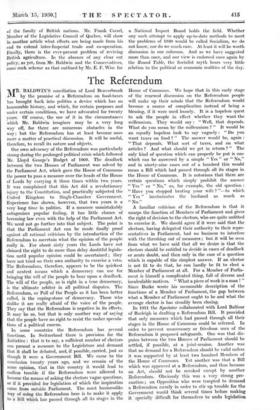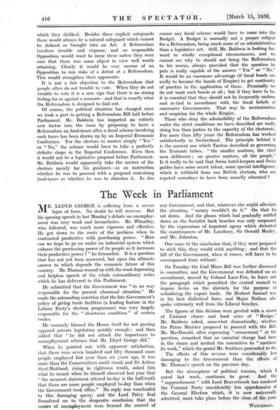The Referendum
MR. BALDWLN'S conciliation of Lord Beaverbrook by the promise of a Referendum on food-taxes has brought back into politics a device which has an honourable history, and which, for certain purposes and under certain conditions, we have advocated for twenty years. Of course,' the use of it in the circumstances which Mr. Baldwin imagines may be a very long way off, for there are numerous obstacles in the way ; but the Referendum has at least become once more a matter of practical discussion. It will be useful, therefore, to recall its nature and objects.
Our own advOcacy of the Referendum was particularly strong during the prolonged political crisis which followed Mr. Lloyd George's Budget of 1909. The deadlock between the two Houses of Parliament was solved by the Parliament Act, which gave the House of Commons the power to pass a measure over the heads of the House Of Lords by carrying it three times within two years. It was complained that this Act did a revolutionary injury to the Constitution, and practiCally subjected the United Kingdom to Single-Chamber Government. Experience has shown, however, that two years is a very long time in politics. If a measure unmistakably antagonizes popular feeling, it has little chance of becoming law even with the help of the Parliament Act. We need not go further into that subject. The point is that the Parliament Act can be made finally proof against all rational criticism by the introduction of the Referendum to ascertain what the opinion of the people really is. For about sixty years the Lords have not claimed the right to do more than delay doubtful legisla- tion until popular opinion could be ascertained ; they have not tried on their own authority to exercise a veto. The Referendum, therefore, appears to be the quickest and neatest means which a democracy can use for bringing the Will of the people to bear upon a deadlock. The will of the people, as is right in a true democracy, is the ultimate arbiter in all political disputes. The Referendum, or Poll of the People as it has been better called, is the coping-stone of democracy. Those who dislike it are really afraid of the voice of the people. They say that the Referendum is negative in its effects. It may be so, but that is only another way of saying that the people have no right to resist the rasher specula- tions of a political caucus.
In some countries the Referendum has several functions. In Switzerland there is provision for the Initiative : that is to say, a sufficient number of electors can present a measure to the Legislature and demand that it shall be debated, and, if possible, carried, just as though it were a Government Bill. We came to the conclusion twenty years ago, and we remain of the same opinion, that in this country it would lead to endless trouble if the Referendum were allowed to become the means of asking the electors vague questions, or if it provided for legislation of which the inspiration came from outside Parliament. The most businesslike way of _using the Referendum here is to make it apply to a Bill which has passed throuih all its stages in the House of Commons. We hope that in this early stage of the renewed discussion . on the Referendum people will make up their minds that the Referendum would become a source of complication instead of being a blessing, if it were used loosely. It is a hopeless quest to ask the people in effect whether they want the millennium. They would say : " Well, that depends. What do you mean by the millennium ? " It would be an equally hopeless task to say vaguely : " Do you want taxes on food ? " The answer would be, again : " That depends. What sort of taxes, and on what articles ? And what should we get in return ? " The only kind of question which can properly be put is one which can be answered by a simple " Yes " or " No," and in ninety-nine cases out of a hundred this would mean a Bill which had passed through all its stages in the House of Commons. It is notorious that there are certain questions which simply prohibit the answer " Yes " or " No," as, for example, the old question : " Have you stopped beating your wife ? "—to which " Yes " incriminates the husband as much as No."
A familiar criticism of the Referendum is that it usurps the function of Members of Parliament and gives the right of decision to the electors, who are quite unfitted to exercise it. We should agree if it were said that the electors, having delegated their authority to their repre- sentatives in Parliament, had no business to interfere with the threshing out of measures ; but it will be seen from what we have said that all we desire is that the electors should be entitled to decide in cases of deadlock or acute doubt, and then only in the case of a question which is capable of the simplest answer. If an elector is not fit to do that, he can hardly be fit to elect a Member of Parliament at all. For a Member of Parlia- ment is himself a complicated thing, full of diverse and incalculable motives. " What a piece of work is a man ! " Since Burke wrote his memorable description of the functions of a Member of Parliament, the gap between what a Member of Parliament ought to be and what the average elector is has steadily been closing.
In 1911 the Spectator collaborated with Lord Balfour of Burleigh in drafting a Referendum Bill. It provided that only measures which had passed through all their stages in the House of Commons could be referred. In order to prevent unnecessary or frivolous uses of the Referendum it proposed safeguards. One was that dis- putes between the two Houses of Parliament should be settled, if possible, at a joint-session. Another was that no demand for a Referendum should be valid unless it was supported by at least two hundred Members of the House of Commons. Yet another was that a Bill which was approved at a Referendum, and thus became an Act, should not be revoked except by another Referendum. Obviously this was a very strong pre- caution ; an Opposition who were tempted to demand a Referendum merely in order to stir up trouble for the Government would think several times before making it specially difficult for themselves to undo legislation which they disliked. Besides these explicit safeguards there would always be a natural safeguard which cannot be defined or brought into an Act. A Referendum involves trouble and expense, and no responsible Opposition would want to incur these unless they were sure that there was some object in view well worth attaining. Clearly it would be very unwise of an Opposition to run risks of a defeat at. a Referendum. This would strengthen their opponents.
It is not a fair objection to the Referendum that people often do not trouble to vote. When they do not trouble to vote it is a . sure sign that there is no strong feeling for or against a measure—and that is exactly what the Referendum is designed to find out.
Of course, the political situation has changed since we took a part in getting a Referendum Bill laid before Parliament. Mr. Baldwin has imported an entirely new factor into the issue by proposing to have a Referendum on food-taxes after a fiscal scheme involving such taxes has been drawn up by an Imperial Economic Conference. For the electors to answer simply " Yes " or " No," the scheme would have to take a perfectly definite shape in the Imperial Conference, Even then it would not be a legislative proposal before Parliament. Mr. Baldwin would apparently take the answer of the electors . merely for his guidance—as an instruction whether he was to proceed with a proposal containing food-taxes or whether he was to abandon it. In due course any fiscal scheme would have to come into the Budget. A Budget is normally not a proper subject for a Referendum, being much more of an administrative than a legislative act. Still, Mr. Baldwin is looking for- ward to wholly exceptional circumstances, and we cannot see why he should not bring the Referendum to his rescue., always provided that the question he puts is really capable of the answer " Yes " Or " No." It would be an enormous advantage (if fiscal bonds are really to become the bonds of Empire) to get continuity of practice in the application of them. Personally we do not want such bonds at all ; but if they have to be, it is essential that they should not be frequently undone and re-tied in accordance with the fiscal beliefs of successive Governments. That way lie recrimination and suspicion for the whole Empire.
Those who deny the admissibility of the Referendum under the strict conditions we have described are really doing less than justice to the capacity of the electorate. For more than fifty years the Referendum has worked satisfactorily in Switzerland. The principle behind it is the ancient one which Tacitus described as governing the 'Teutonic tribes. " On smaller matters, the chief men deliberate ; on greater matters, all the people." Is it really to be said that Swiss hotel-keepers and.Swiss guides have some secret talent, some special intelligence, which is withheld from our British electors, who are reputed nowadays to have been soundly educated ?





















































 Previous page
Previous page